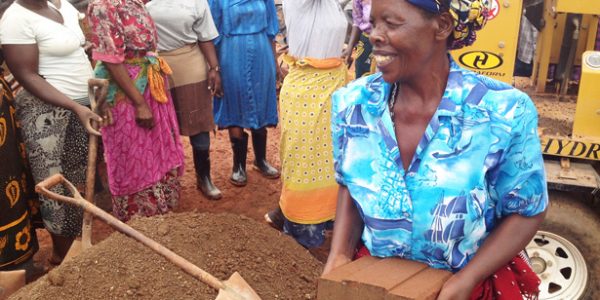Women have traditionally been disproportionately impacted by and economically vulnerable to HIV/AIDS and poverty for several reasons. For example, women typically play the role of caregivers (to produce children and provide labor) and, therefore, it is difficult for them to travel to access water sources and sanitation facilities because they need to stay home to care for their children and the sick. Often if they cannot afford the cost of a jerry can of water or cannot access other sources, women must rely on water accumulated on the roofs of their homes where waste is also thrown. Women are often blamed for bringing disease into the home, regardless of whether it was their male spouse who infected the family. As a result, women avoid disclosing their HIV status and do not seek treatment for fear of facing stigma and discrimination, causing them to be at increased risk for contracting opportunistic infections and falling ill to an earlier death. In many cases, women who are afflicted with HIV are isolated by the stigma of the disease and, as a result, lack productive work opportunities or must travel long distances to work where their status is unknown to their employer. Similarly, HIV positive women face increased difficulty accessing micro-finance credit due to stigmas and discrimination. Women are the poorest group in Uganda because they are not well educated and cannot be employed or earn income in the monetary economy, which prevents them from acquiring and/or accessing basic goods and services. Women need to be empowered to make their own choices and control their own lives, which will involve, above all, equal and fair access to education and income generating activities.
GENDER & WOMEN'S RIGHTS
WOMEN AND HIV/AIDS
WOMEN AND HIV/AIDS

WOMEN AND LAND
Women are also the more vulnerable group in Uganda’s patrilineal society because they are not land owners, and therefore are essentially homeless and not in charge of their own resources. While women use land disproportionately more than men to produce food, they are not expected to manage their own lands, unless they fail to marry or are divorced and become the head of the family, but this also remains socially unacceptable. There is high land tenure insecurity among women who are thrown off their land when they become AIDS widows or are suspected of being HIV positive. Women easily fall victim to a cycle of poverty and are more dependent on men when they are tied to their husband’s family and have no alternative place to live or source for cash. Even with the inclusion of the ‘consent clause’ in the Land Act whereby women/wives need to consent to their husband selling their land or homes, there is a lack of clarity concerning the definition of a wife, which often does not protect common law spouses, etc. One stakeholder noted that the most dangerous phrases used today in land cases are: “Women do not have rights under customary tenure” and “Customary tenure does not allow women to own land”, which are both false claims (women do have rights to land under customary law by right of being wives and family/clan members). Given that there is no firm system for land succession in patrilineal societies practicing customary law, these statements create more vulnerability for women (particularly for widows, women living with HIV/AIDS, and divorced mothers) who are already economically vulnerable to eviction and land grabbing by economically stronger groups including men, the educated, the rich, and those in positions of power. While the Domestic Relations Bill was drafted to ensure the legislation of equality for women and has been presented in Parliament, it has not yet been debated and is unlikely that it will pass with its initial comprehensive resolutions.
